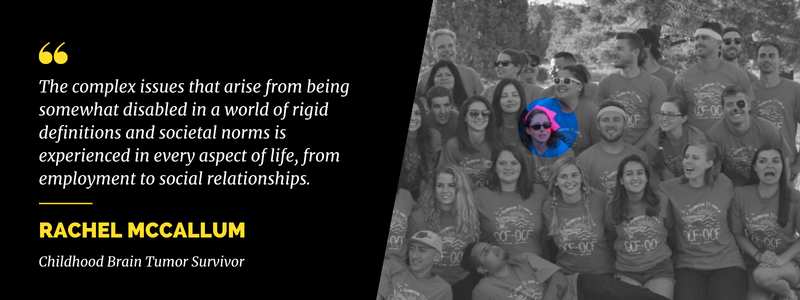Cancer Survivorship & Employment Challenges: Rachel's Story
If you’re a cancer survivor thinking about current or future employment options, it’s important to consider carefully the types of positions that are a good fit - especially if you struggle with long-term physical or cognitive late effects as a result of your cancer or its treatment.
We’re sharing Rachel’s story here because we know she isn’t alone in her struggles and frustrations with navigating employment options as a cancer survivor.
"I'm fully capable of performing a job. I've even tried to meet the past generation's expectations and gotten full-time, 9-5 jobs," says Rachel, who was diagnosed with a brain tumor in kindergarten -- more than thirty years ago. "These jobs usually consisted of something well below my skill level like filing, scanning, or organizing, but I was willing to do them because I was told by my elders that my work would be appreciated enough that I'd move up or be offered a 'real' job eventually."
These were hourly jobs without benefits, and she relied on her parents and then later Medicaid for health insurance.
"But with all the mental and physical disabilities racking up, a full-time job on my feet was exhausting. I doubt I would've had the energy to make or eat food if I hadn't had my mom and dad make me dinner most nights," Rachel told us.
Rachel has a graduate degree, but she's had difficulty finding a steady job in her field. "I was never given any explanation as to why I wasn’t chosen, but I suspect that ableism and the assumption that these positions would be 'too fast paced' for me had something to do with the rejections," she told us in a prior blog post. "Even in the 'best of times' (if any of my adult years can be thought of as such) I was being rejected for permanent positions and given no explanation as to why."
Rachel recently made the bold decision to move across the country, partly to step outside her comfort zone with something different, partly because she felt a responsibility to let her parents "enjoy being empty nesters" after so many years of sacrificing to meet her care needs, and partly because of the high cost of living in her home state of California.
Rachel's trying so hard to overcome the challenges posed by her treatment-induced late effects and to navigate adulthood independently, but - like so many survivors we hear from - she's frustrated. Can she achieve full independence without needing to fall back on her parents' help? Are her disabilities "severe enough" for disability benefits? Should she keep trying to work jobs that she hates and that make her physical and mental health worse?
Knowing your limits, your stress triggers, and how to say ‘no’ are important but often challenging workplace skills. On our Stewart survivorship site, we've got information and resources about navigating professional boundaries, job interviews, disability rights, and workplace discrimination.
Rachel is a member of our Survivorship Advisory Council and hopes that her advocacy can help find policy solutions that give adult survivors of childhood cancer an easier path to disability benefits. We're grateful for her bravery in sharing her story and her challenges. You can read all of Rachel's Children's Cancer Cause guest blog posts here.
Do you have a story to share about navigating the workplace as a cancer survivor? We'd love to hear from you!

